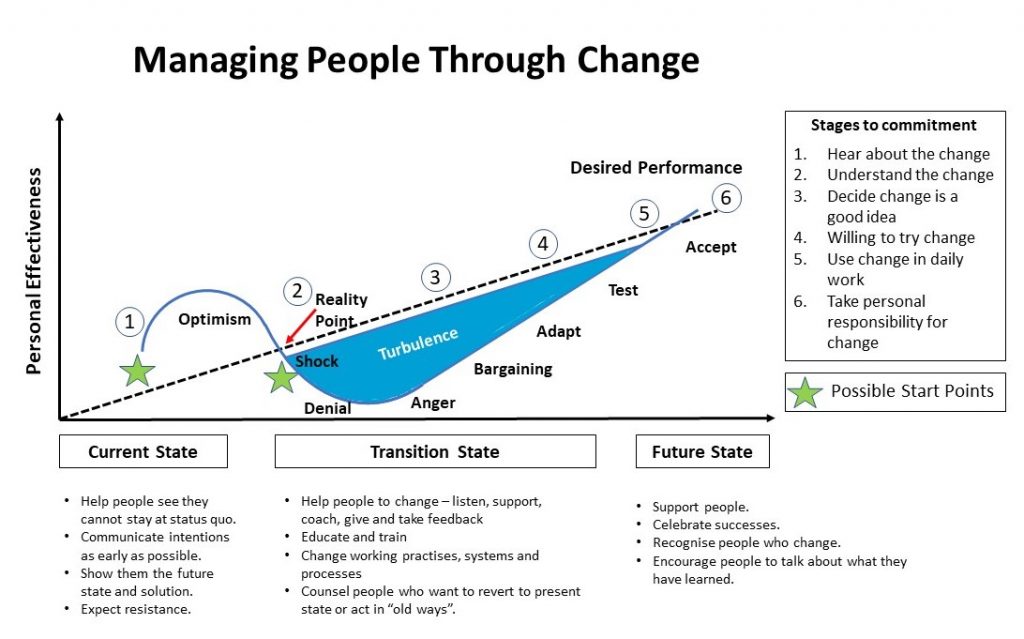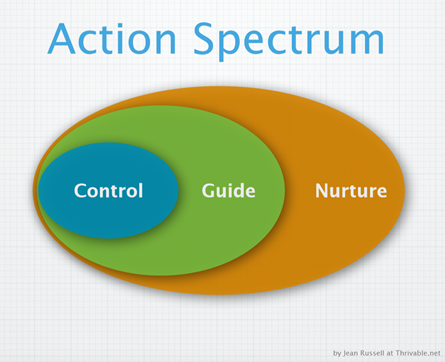Managing People Through Change
Heraclitus, the Greek philosopher said, “Change is the only constant in life.”
At a time when we hope that the rate of change will settle, it seems to be speeding up, with more surprises around every corner.
However, if we take a proactive approach to managing change with our teams, we can help them get to a better place and get used to the fact that change is constant and something we need not fear.
For things to get better, for improvement to take place, this requires change.
In life and in nature, cycles of change happen daily and throughout the seasons.
It’s often not the change itself that makes people nervous and anxious; it’s when change is not anticipated, happens as a surprise or is a shock, that emotions can kick in and make the transition challenging to understand and accept.
As with most things in business and psychology, there are processes that can help us.
The diagram below illustrates very well the roller coaster ride of emotions, understanding, adaptation and ultimately acceptance that can occur for most of us through the process of change.

Our role as leaders, is to help people see that the status quo is not an option, to paint a picture of the future and show a pathway to get there. We must understand that every person is unique and should be allowed to experience their own version of their current reality. This reality is based entirely on their own perceptions, fears, and emotions. We should expect resistance, so be prepared to listen, support and coach people around the obstacles and towards an understanding that the change is a good idea. The grip that fear has on them, will loosen and they will be free to adapt, to try doing things differently and accept that change is good and hopefully, be looking out for opportunities to change more, for the better, in the future.
Remember to share your vision of the future, tell them what your just told them and just when you think you are done, tell them again and accept questions to gain an understanding every step of the way. The aim is to have a team of willing participants reach the future state who are ready to take the next opportunity for change, when they see it.
Ian Featherstone is a cabinetmaker, machinist, business advisor, mentor and leadership coach, and the owner of Glass Half Full. He specialises in the construction industry, particularly the joinery & cabinetry sector. For more information or to find out how you can move your team forward, please visit www.glasshalffull.co.nz
Its more than steering a course – this situation requires Stewardship
March 2022 marks 5 years of writing this column, thank you to Bob, Michael, and Joiners Magazine for the opportunity to share views, stories, and ideas all of you in the industry.
As we move further into 2022, we are sure that the only thing we can be certain of, is more uncertainty and with that the challenges of leading a business forward in unchartered territory once again.
To lead in these times, will require something more, like Stewardship, which can unite, align and bring out the best in your team.
Beware of getting stuck in managing mode
The traditional approach is to create a plan behind closed doors, plotting the course and controlling the flow of work and resources.
Instead, with belief in the life that exists throughout the organisation, a process of invitation and encouragement can be set into motion, connecting people to each other and to their dreams for themselves and for their shared experience of community… revealing hidden gifts and releasing pent-up energy… and cultivating the organisations inherent capability to thrive.
To enable the system to take on a life of its own and to help it become truly self-generative, the challenge of stewardship is to navigate a thoughtful mix of control, guidance, and nurturing; to tend to both individual and collective; and to support the system’s wisdom, learning and enrichment, as well as its accomplishment of tasks and milestones.
Along the way, the wise steward’s questions include: What would bring the most life to this situation? What is the wisdom that is needed now? What seems to want to come to life here? How can I serve this unfolding, either by disturbing things, by planting a seed, by cultivating a freshly sprouted initiative, or by compassionately hospicing something that needs to die?
Stewardship requires thoughtful crafting of structures and systems. It necessarily takes a holistic view — which in organizations means linking purpose with passion, brand with culture, and worker with customer and community.

Management Controls
Management continues to be appropriate for the useful, surface-level busyness of the day-to-day, with its focus on controlling the parts — rather than on the system as a whole — through tactics, action plans, performance goals, and expert-driven solutions in a push to achieve certain, generally known, outcomes.
Leadership Guides
As we shift our focus from efficiency of parts to effectiveness of interactions, leadership becomes the stance of choice. Where patterns of relationship and supportive, connected infrastructure are the primary leverage points, leadership offers guidance (rather than control) through strategies, structures and processes. The leader shapes human dynamics through influence and incentives, as well as through shared values and principles.
Stewardship Nurtures
If our aim is to grow the capability of the system — then we shift from managing the parts and leading for effectiveness to stewarding the health of the whole. Here, control and guidance are replaced by encouragement and invitation, with continuous iteration and attention to evolving patterns of “what wants to happen here?” The goal is not to control, but to create the fertile conditions for something new and unknowable to emerge. The intention is to nurture the system’s intrinsic and ongoing capacity for learning, innovation, self-organization and, ultimately, thriving.
Adapted from an article by Michelle Holiday
If you want to build a ship, don’t drum up people to collect wood and don’t assign them tasks and work, but rather teach them to long for the endless immensity of the sea.
~ Antoine de Saint-Exupery
If you would like to talk in confidence about any of the above or feel the need to reach out, please call me for a no obligation chat (number on website link below)
Ian Featherstone is a cabinetmaker, machinist, business advisor, mentor and leadership coach, and the owner of Glass Half Full. He specialises in the construction industry, particularly the joinery & cabinetry sector. For more information or to find out how you can move your team forward, please visit www.glasshalffull.co.nz





